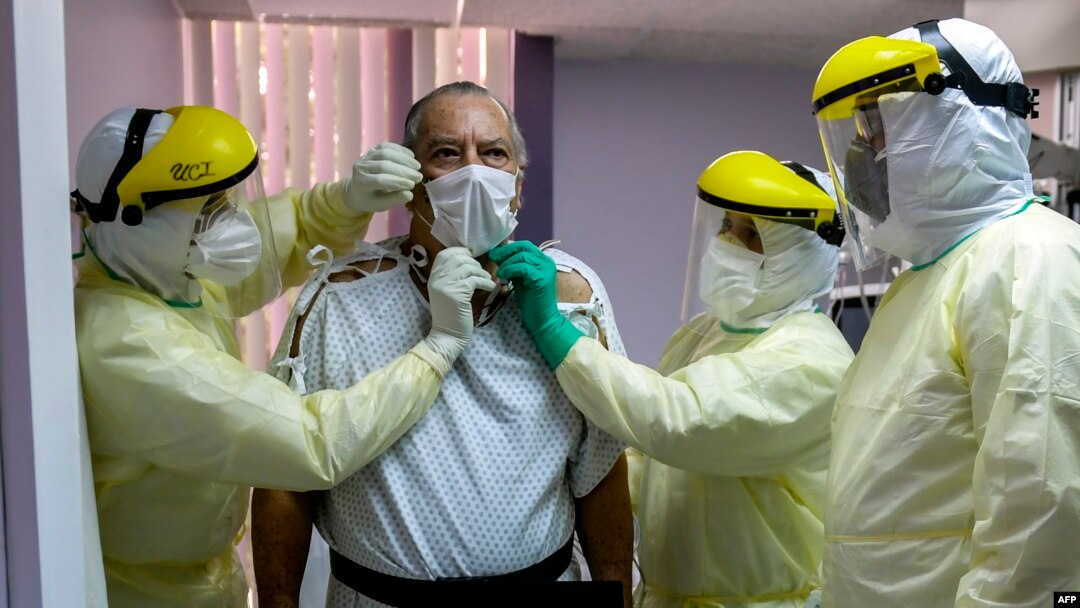The mental health impacts of COVID-19 may linger after the pandemic is over.
New research suggests that some patients hospitalized with the coronavirus infection are likely to suffer from anxiety, depression and post-traumatic stress disorder months or years after they are released.
The risks may be higher for the general public as well. Widespread job losses, media overload and the isolating effects of social distancing may lead to an increase in mental health problems, experts warn.
About 15% of patients hospitalized with SARS or MERS, two coronaviruses closely related to the one that causes COVID-19, suffered from depression or anxiety up to three years after they left the hospital, according to a new study in the journal The Lancet Psychiatry.
"The good news is that most people don't suffer a mental illness, even after being in [intensive care], and the majority of people returned to work," said University College London psychiatrist and study co-author Jonathan Rogers.
He did, however, say, "With the number of people globally who are being admitted to hospital [and] admitted to intensive care units, I think we could see a lot of PTSD in the aftermath."
Just being in the intensive care unit is a traumatic experience. One study found that more than half of ICU patients had anxiety, depression or PTSD a year after their stay.

A nurse works at a drive-thru testing site for the coronavirus disease (COVID-19) at North Shore University Hospital in Manhasset, New York, May 6, 2020.
Extra trauma
Rogers says being in the ICU with COVID-19 might be more traumatic because patients with a highly infectious disease are deprived of the usual sources of comfort.
Family members can't sit by the bedside. And it's hard to develop a bond with a health care worker who is hidden behind protective equipment.
"You don't recognize people. We all look the same. You can just see our eyes," he said.
COVID-19 also may be more stressful than other hospital stays because patients don't get to go back to normal lives afterwards. Between social distancing measures and economic fallout, normal life has been canceled.
"The stress continues after recovery," said psychiatry professor Iris Sommer at University Medical Center Groningen in the Netherlands, "especially if there is financial misery as well."
The pandemic has pushed the U.S. unemployment rate to 14.7 %, its highest rate since the 1930s Great Depression.
Unemployment and poverty "are giant risk factors for depression and especially also for suicide," she said. Rates of both increased in the United States and Europe during the 2008 financial crisis, the 2010 Greek debt crisis and in Japan during the 1997-98 economic crisis, Sommer noted.
Less social
The mental health fallout from COVID-19 spreads beyond those infected in many ways.
Restrictions on gatherings have meant that families and friends of those who lost loved ones have not been able to hold funerals that would provide comfort and support.
Weddings, graduation ceremonies and other events have been canceled, adding stress to an already stressful time.
And while many places are starting to ease social distancing measures, Sommer said, things will not be going back to normal anytime soon. For example, watching sports in groups is likely off the table for the foreseeable future.
"Our societies will become less social," she said. "That's not a good thing."
Those who already struggle with anxiety, depression or other mental illness are most likely to suffer the mental health consequences of the pandemic.
"That doesn't mean that they're doomed," University of California, Irvine psychology professor Roxane Cohen Silver said, but they and their caregivers should be aware of the increased risks.
Healthcare workers and patients are shown inside the Intensive Care Unit for COVID-19 of the Gilberto Novaes Hospital in Manaus, Brazil, May 20, 2020.
News cycle
Limiting media exposure is a good idea, she said. People who watched more media coverage of other traumatic events, such as the September 11, 2001 terrorist attacks and the 2013 Boston Marathon bombing, were more likely to suffer from post-traumatic stress disorder symptoms in the aftermath, she said.
Certain people seem to be more susceptible, Silver added.
"We've found in studies that we've done over the last 10 years or so that individuals who are anxious seek out media, and the media makes them more anxious, which leads them to seek out more media," she said. "It's a vicious cycle that people have difficulty extricating themselves from."
What we can do
Experts say it's important for people who are anxious or depressed to reach out to family, friends or others who can provide support, even though — or perhaps because — it's harder now with social distancing.
Call or video chat. Reach out to health professionals. Call a help line.
"Cherish the contacts that you can still make," Iris Sommer said.
Help for those in crisis (U.S.):
• National Suicide Prevention Lifeline: Call (800) 273-TALK (8255)
• Crisis Text Line: text "HOME” to 741741 to chat with a trained crisis counselor
• SAMHSA Disaster Distress Helpline: call (800) 985-5990. Press 2 for Spanish-language support.


